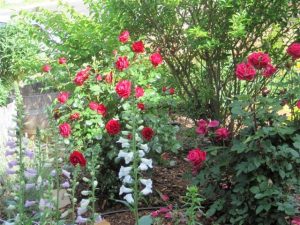It is said that the ocean begins at our front door. In other words, what we do in our homes and gardens can affect the waters hundreds, even thousands, of miles away. In the 1960s, escalating manufacturing and use of synthetic fertilizers resulted in a steep rise in air and water pollution. Soil nitrogen in excess of that used by gardens and crops proved to be especially troublesome.
THE DILEMMA: Nitrogen is an essential element in all living bodies and vital to plants. However, in our eagerness, we often apply more than is needed and negatively impact soil health by depleting beneficial organisms and earthworms.
Broken down by soil microbes, excess nitrogen also becomes a bad actor in the atmosphere and in water. In surface water, nitrogen and phosphorous feed the growth of algae which deplete water’s oxygen level. Areas of “dead” water can result, such as that in the Gulf of Mexico and in California estuaries. Polluted groundwater can create sickening levels of nitrate in drinking water. Nitrous oxide also destroys stratospheric ozone which protects the planet from harmful ultraviolet rays.
USE FERTILIZER WISELY: Decrease, even eliminate the need for commercial fertilizers by instead applying compost and aged barnyard manure. If using commercial fertilizers, rely on those that are less concentrated or slow-release. Organic fertilizers such as blood meal, cottonseed meal, fish emulsion, and seaweed extract also provide nitrogen in lower concentrations. Follow label instructions and do not exceed the recommended application rate. More is not better!
ADDITIONAL STRATEGIES: Use drip irrigation, soaker hoses, or low-volume mini-sprinklers to assure that landscape water soaks in rather than running off. Avoid watering walkways and other hard surfaces. Reduce runoff with pervious pavers, stepping stones, or gravel; plant a rain garden; install a roof garden. Catch roof runoff in rain barrels or other catchment devices; later water your yard with this stored water.
Mulch with fallen leaves, wood chips or gravel to lessen irrigation needs. Leave lawn clippings in place, which then break down lessening both fertilizer and water needs. Grow more plants native to our region. Natives rarely require any fertilizer at all and are usually drought tolerant once established.
Read more about agricultural nutrient pollution at http://www2.epa.gov/nutrientpollution/problem.
Vera Strader fertilizes and enriches the soil in her garden with homemade compost plus aged chicken and horse manure.


